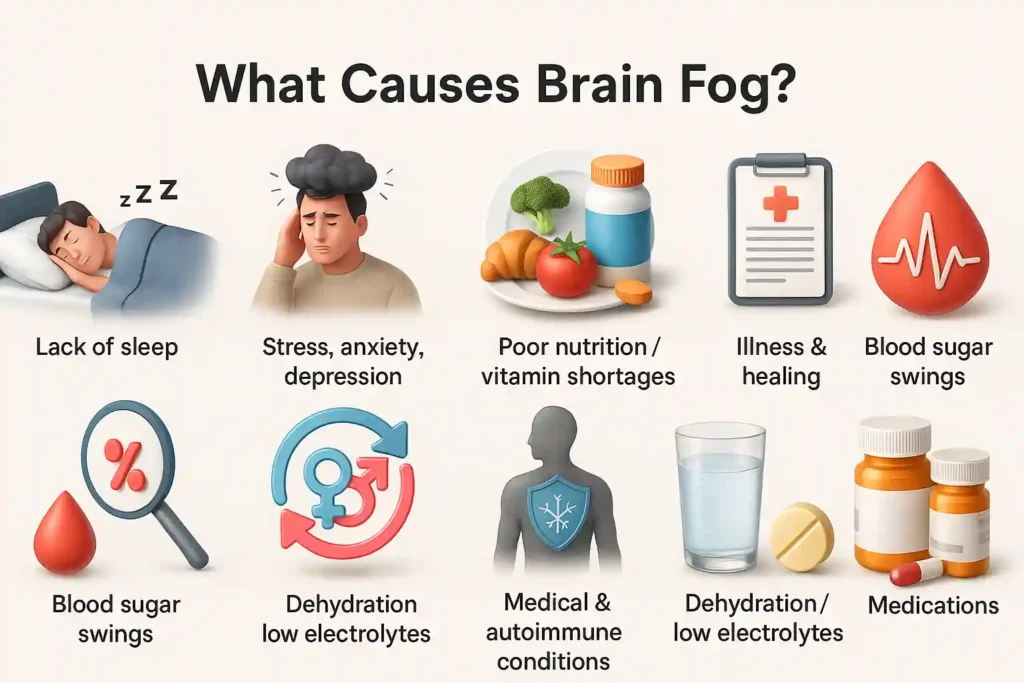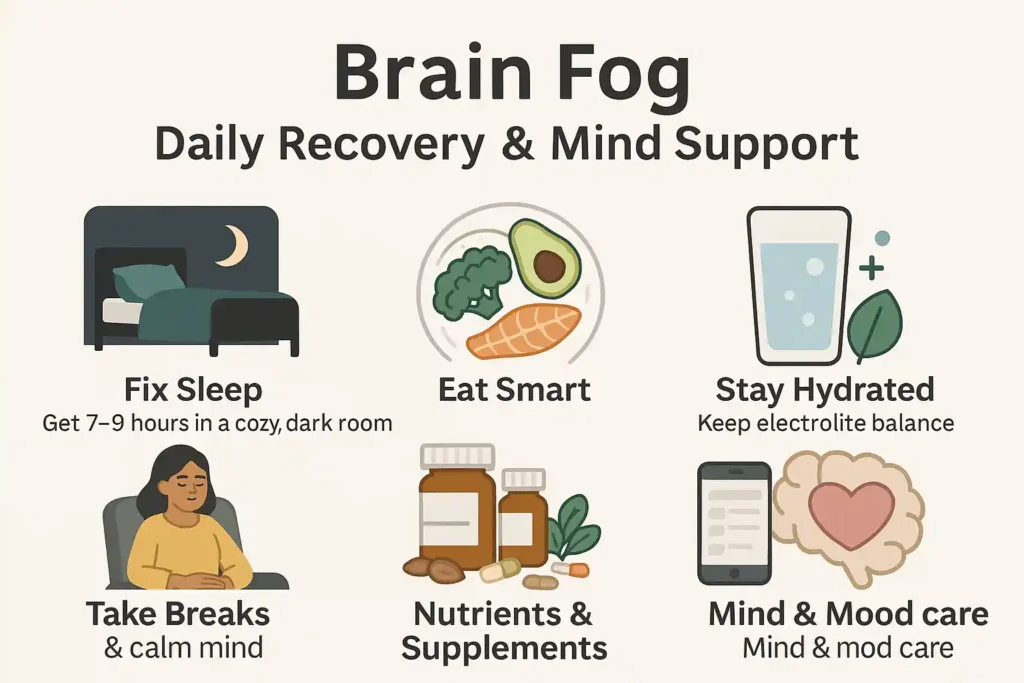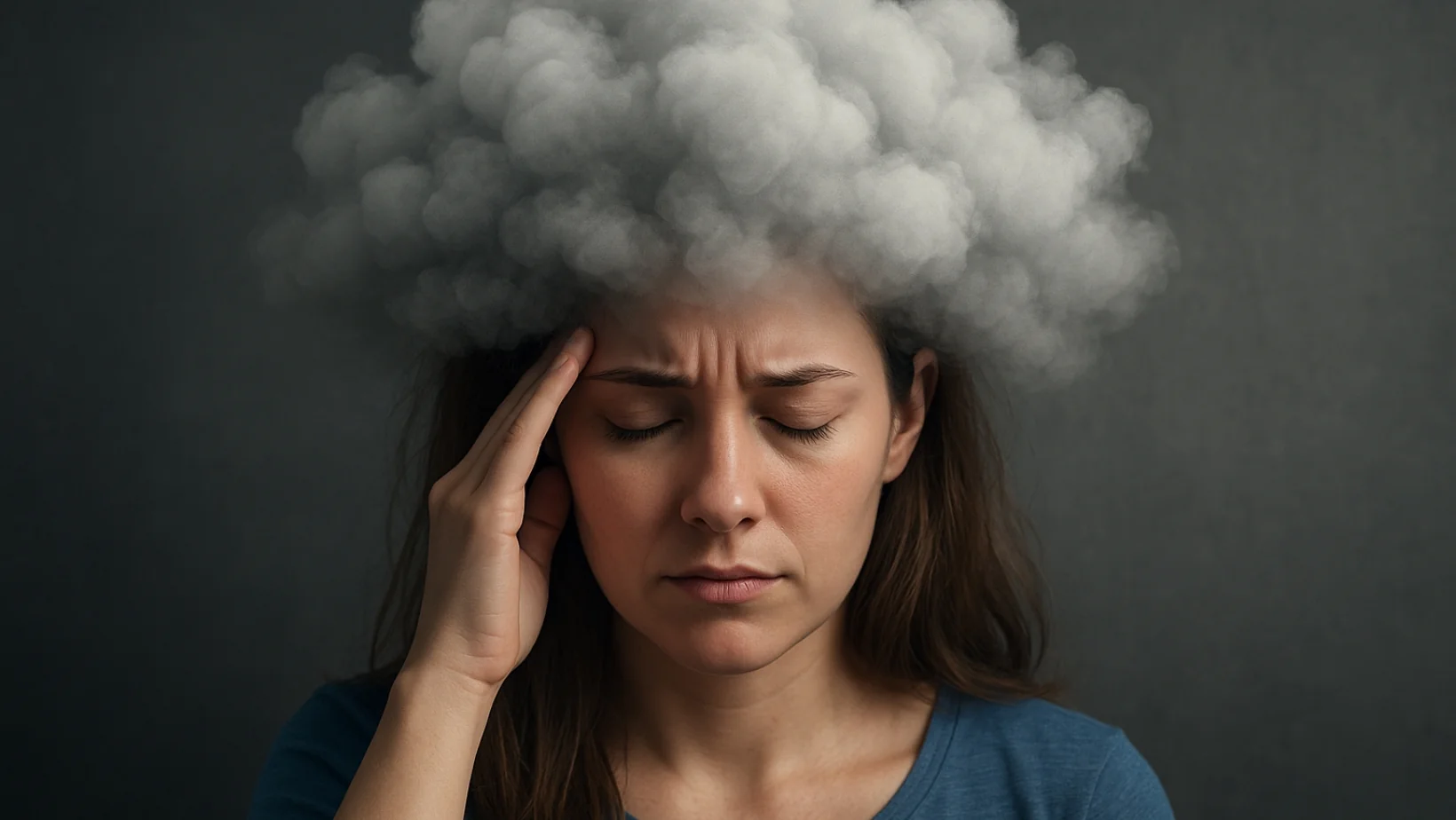What is brain fog?
Brain fog is when your mind feels cloudy. You might struggle with thinking, focusing, or recalling information. It makes everything feel slower and tougher.
What does brain fog feel like?
- You might lose your train of thought, even in a simple chat.
- Forgetting words becomes common.
- Your mind feels tired and slow, like you’re walking through sticky air.
- You may feel confused or stuck, like a video buffering and pausing.
Possible Causes
What causes brain fog?

Here are common brain fog causes you should know:
- Lack of sleep (sleep deprivation effects): missing rest slows your mind and makes focus disappear.
- Stress, anxiety, and depression can undermine your attention and deplete your energy.
- Poor nutrition or vitamin shortages, like low B12: your brain needs these to work well.
- Hormone shifts, like during pregnancy, menopause, or low thyroid: these can cloud thinking.
- Illness and healing, like long COVID or chemo: the body and brain may stay foggy even after illness ends.
- Medical and autoimmune conditions: lupus, MS, chronic fatigue, fibromyalgia, they all can bring fog.
- Blood sugar swings: big ups and downs can make it hard to think.
- Dehydration or low electrolytes: even mild dehydration can muddle your mind.
- Medications: some meds for allergies, mood, sleep, or nausea can lead to fog.
Care and Treatment

How do I get rid of brain fog?
Let’s explore brain fog treatment ideas that actually help:
- Fix sleep: get 7–9 hours in a cozy, dark room every night.
- Eat smart, with brain-friendly foods: vegetables, fatty fish (like salmon), berries, nuts, whole grains. These support focus and health.
- Stay hydrated and keep electrolyte balance. Think water, coconut water, bananas, spinach.
- Move your body: even 30 minutes of walk or play can clear your head.
- Take breaks, calm your mind: rest your brain. Breathe, walk, or do simple stretches.
- Nutrients and supplements: try B complex vitamins, omega-3, magnesium, vitamin D or herbs like rosemary, Bacopa, lion’s mane mushroom but always ask a doctor first.
- Mental tools: use notes, phone reminders, calendars to help with memory.
- Mind and mood care: talk therapy, mindful breathing help reduce stress and improve cognitive function.
How long does brain fog last?
That varies:
- Temporary fog from dehydration or a night’s poor sleep may lift in hours or a day.
- If tied to a condition like long COVID or chronic fatigue, it may last weeks, months, or longer.
Can brain fog be prevented?
You might not stop it every time, but you can try:
- Healthy sleep habits.
- Balanced diet and hydration.
- Regular exercise.
- Managing stress well.
- Writing a symptom journal to spot your triggers.
When To Call the Doctor
When should brain fog be treated by a healthcare provider?
Talk to a doctor if:
- Fog keeps coming back or sticks around for long.
- You can’t do daily tasks.
- You’re not just forgetful, you feel lost, confused, or notice other odd symptoms like chest pain or quick heartbeat.
- A provider may run tests (blood work, imaging, sleep study) or check for underlying medical issues.
The bottom line
Brain fog isn’t a disease, it’s a messy feeling that stops your mind from working its best. Nevertheless, the good news is that you can often resolve it. Sleeping well, eating right, staying hydrated, moving more, and reducing stress all help reduce brain fog. When lifestyle steps aren’t enough, a doctor can help dig deeper with tests and treatments.
Don’t ignore that cloudy feeling, you deserve clear thoughts and a sharp mind!
FAQs
How do you get rid of brain fog?
By boosting sleep, eating healthy, drinking water, moving your body, managing stress, and using tools like notes. If that doesn’t work, a doctor can help find root causes and offer treatment.
How do I know if I have a foggy brain?
If your thoughts feel slow, you forget things, you struggle to focus, or you feel mentally tired without clear reason, it’s likely brain fog.
What does your brain fog feel like?
You might feel like you’re operating with a low battery, thinking is hard, words slip away, and tasks take more effort than usual.
What exactly causes brain fog?
Lack of sleep, poor food, dehydration, stress, medical conditions, hormones, or even medication side-effects can all cause it.
Is brain fog a disease or a symptom?
It’s a symptom, not a disease. It’s a way your body signals that something, like lack of sleep or stress is harming how your brain works.
Can stress cause brain fog?
Yes, stress releases cortisol and wears down how well your mind concentrates and remembers.
What are the common signs of brain fog?
Trouble concentrating, memory slips, slow thinking, confusion, mental tiredness, and finding words hard to recall.
How long does brain fog last?
It could clear in a day or two if it’s from tiredness or dehydration. But if it relates to long COVID or another health issue, it might last weeks, months, or more.
















Leave a Comment